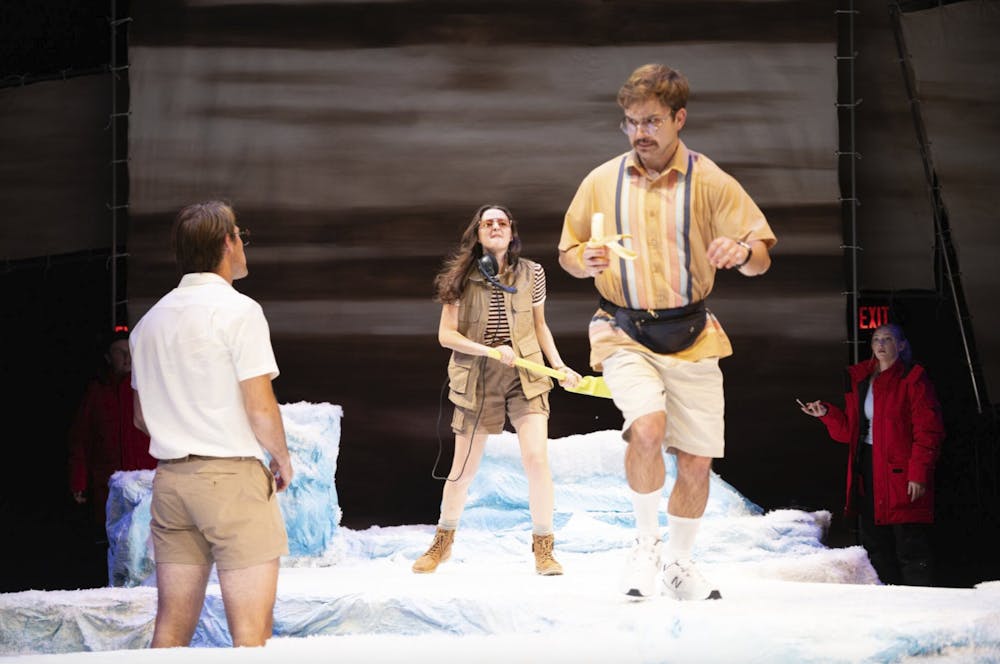Editor’s note: Fourth-year College student Xander Tilock, who plays the role of Larry in “Continuity,” is a Cavalier Daily editor and had no involvement with this piece.
For the past two weekends, audiences gathered in Helms Theatre in the University Drama Building to watch the department’s first play of the year, “Continuity.” Running from Oct. 30 to Nov. 1 and continuing from Wednesday to Saturday, the play marked an intriguing start to the University’s season of shows and events.
Originally written by Bess Wohl in 2017, the one-hour and 20-minute story follows a film crew attempting to finish filming their movie about climate change and struggling to capture the best take of an impactful scene that they hope will empower viewers. The show used grounding narratives combined with comedic timing to acknowledge the chaotic process behind filmmaking and address issues with modern depictions of climate change in the media.
The scene they are trying to film lasts only a few minutes and involves the main characters having a confrontation with an eco-terrorist, a former scientist and colleague of theirs, on an ice cap in a dangerous turn of events. As each shot of the scene fails, personal conflict is revealed between the characters throughout the play, while the actors of the film struggle to convey the hopelessness of climate change in their line delivery or word choice.
From the play's opening scene, it is clear that these character dynamics — those of the crew and the actors playing their on-screen and off-screen personalities — are important to follow closely. Fourth-year College student Anika Gupta was in the audience of Friday’s show and said the idea of continuity in filmmaking helped highlight the dynamics between the characters throughout the different takes of the movie scene.
“I liked how they had the theme of continuity, and then they did the scene again and again,” Gupta said. “I think it kind of explained the nuances of science and human relationships really well.”
One of the more complex relationships follows the film’s struggling director Maria and her ex-boyfriend and studio representative Caxton, played by fourth-year College students Lilla Woodard and Jack Ireland. Many of the key scenes within the play feature their arguments and compromises over the making of the film, all while struggling to cope with Caxton’s cancer diagnosis.
Building on these tensions, the story also explores the crew’s misguided approach to climate change, warranting a science advisor named Larry, played by fourth-year College student Xander Tilock, to be brought on set to educate the group. Larry’s visit stirs trouble when he leaves the crew puzzled by stating that those who watch movies or television series on climate change are often less likely to implement action, insinuating that their project could ultimately amount to nothing.
Fourth-year College student Charlotte Jackson attended Friday’s show and said she found the perspective Larry introduces to be interesting as it points to different narratives surrounding climate change.
“We kind of feel the opposite of guilt when [we] watch a movie about climate change,” Jackson said. “And you think, ‘Oh, well, I recycle, so you know, I'm helping the world,’ when in reality, [Larry] said it doesn't really make a difference.”
Lightening the tone of the play are other supporting members seen floating in and out of each scene. This includes the roles of the on-set assistant director and production assistant, played by fourth-year College student Clay Dickerson and third-year College student Virginia Keen, who mainly repeat demands or conversations over intercoms or run back with diet sodas for the movie actors. While they have the fewest speaking lines, their personalities and characters provide the most comedic relief throughout the story.
Keen commented on how she brought a new edge to her character as the production assistant during each show to recognize those in the film industry who are often sidelined on large sets and have to deal with constantly adapting environments.
“In shooting movies, there are so many producer assistants that just go unnoticed, unrecognized, and I wanted to bring that to the play,” Keen said. “Every night I'm maybe more sad, maybe, you know, I am harsher, or I just kind of try to play with the other actors on stage and let their reaction affect me.”
The characters and their roles also displayed categories people experience in Hollywood filmmaking. For example, there’s a scene where the actress Nicole and her colleague Lily, played by fourth-year College students Maya Berry and Bryce Kirkland, have a conversation about the types of roles they typically experience in their acting careers. The exchange — between a white actress and Black actress on the film set — highlights how self-perception and racial identity intersect with the limiting labels women face in Hollywood.
Other themes in the play center around sexuality, with George — the actor who portrays the eco-terrorist in the film — played by second-year College student Braden Williams, telling Lily he does not typically mention his relationship with his boyfriend due to his career as an action star. Keen commented on how the play discusses these important topics of identity through layers of comedy, specifically by grounding deep themes through events that occur today in real-time.
“Even though it's modern and supposed to be accepting, because [Jake’s] a major actor star, he feels like he can't come out,” Keen said. “The play itself is so funny, but if you kind of peel back that layer of comedy, it's dealing with really complex, deep, hard topics.”
The crew is left grappling with Larry’s troubling insight about the film’s potential futility by the end of the play, making it difficult to feel relief when they finally get the best shot of their movie scene done.
Although it ends on this jarring note, “Continuity” importantly discusses the need to reshape the narrative people typically associate with climate change. Overall, the show displayed a complex and deep question for the audience to ask themselves — how can we implement proper action and create meaningful media in the face of climate change?







